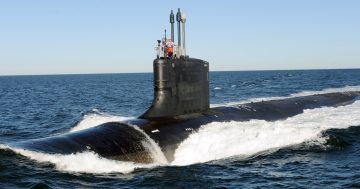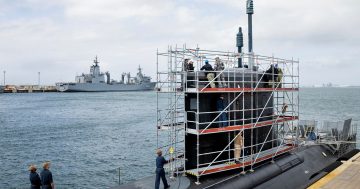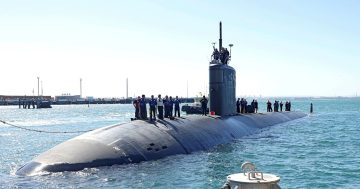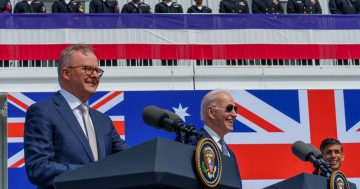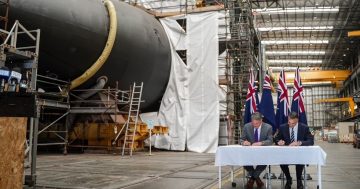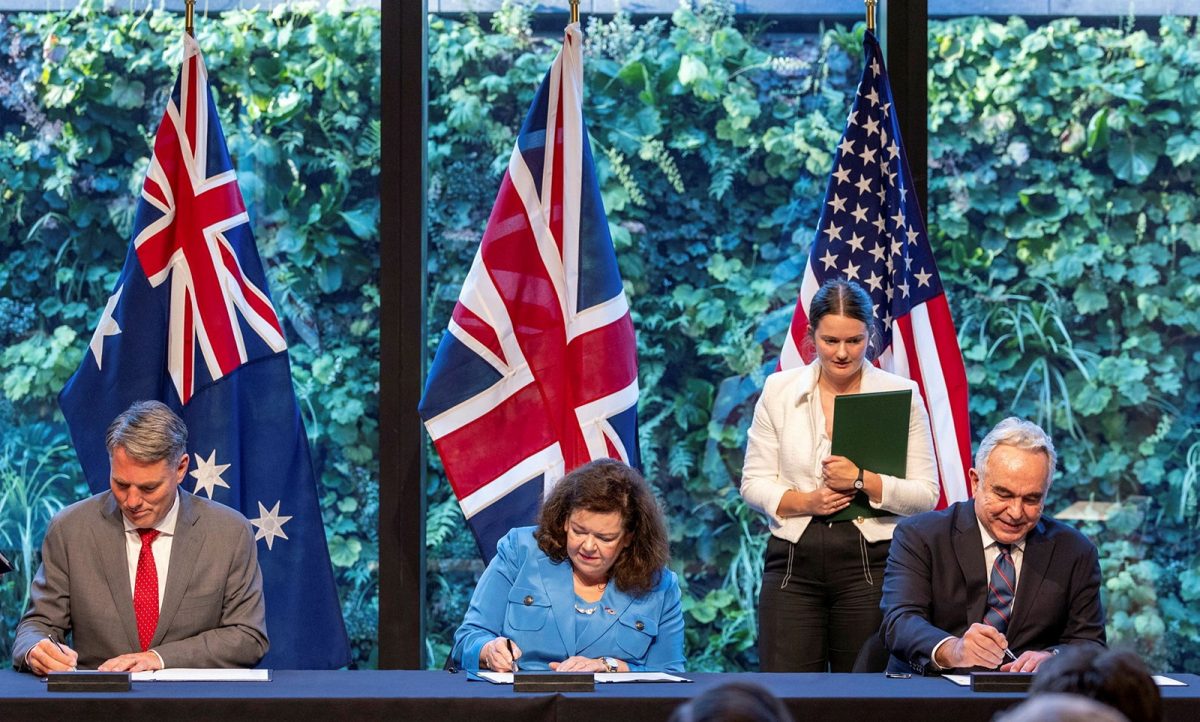
Richard Marles (left) and US and UK officials sign the updated AUKUS agreement in Washington, DC, on 5 August. Photo: ADF.
The AUKUS partners, Australia, the UK and the US, signed an updated 51-year agreement on 5 August that will enable the export of nuclear powerplants for Australia’s planned fleet of Virginia and SSN-AUKUS nuclear-powered submarines.
The Federal Government says the agreement is essential to Australia’s capacity to safely build, operate and maintain a conventionally armed, nuclear-powered submarine capability. The 37-page agreement was tabled in Parliament on its resumption from the winter break on 13 August and has immediately come under intense scrutiny.
“All naval nuclear propulsion reactors for Australia’s nuclear-powered submarine program will be provided by the UK or the US. This Agreement will provide the UK and the US the legal authority to enable the transfer of naval nuclear propulsion reactors and related items to Australia,” the agreement reads.
“The Agreement is critical to meeting Australia’s national interest in achieving the Optimal Pathway for acquiring nuclear-powered submarines for the Royal Australian Navy.”
The Optimal Pathway for AUKUS Pillar One will initially see US and UK submarines conduct extended deployments to HMAS Stirling in Western Australia from 2027. Australia will take delivery of between three and five Virginia-class submarines from the US Navy from 2032, and will build its own SSN-AUKUS submarines, based on a British design with a US combat system, at Osborne in Adelaide for delivery from 2042.
And not that it’s likely, but the updated agreement also effectively prohibits Australia from obtaining nuclear weapons, specifically stating Australia remaining a signatory to the nuclear non-proliferation treaty is a condition of the agreement continuing.
“The Agreement prohibits the use of naval nuclear propulsion information, nuclear material and equipment communicated, exchanged or transferred … for any nuclear explosive device, or for research on or development of any nuclear explosive device. It acknowledges that all Australian nuclear-powered submarines will be conventionally armed,” it says.
The agreement expires on 31 December 2075, although it says any party may terminate the agreement by giving one year’s notice in writing to the other parties. It suggests the only possible ground for a termination of the agreement is if any party breaches the terms of the agreement, including if Australia obtains its own nuclear weapons or uses the nuclear technology transferred to it to develop nuclear weapons.
But critics claim that, despite Australia investing nearly $10 billion into the UK and US submarine and shipbuilding industrial base, there are no guarantees Australia will ever receive a nuclear-powered submarine.
The original 2023 AUKUS agreement held a disclaimer that the US President of the time would be required to advise Congress that the US could afford to release submarines to Australia. But in order to do that, it needs to be building boats at a rate of 2.33 a year at its two shipyards. The most recent published build rate is 1.35 boats a year, with few indications of any imminent increase.
So, with the US Navy currently only able to build submarines at barely half the rate it needs, it remains difficult to see how Virginia-class submarines could ever be released to Australia. And therein lies the rub.
The updated agreement says nothing to change that.
“The trilateral partners also concluded a non-legally binding Understanding … which reflects the governments’ intended approach to certain articles of the Agreement and provides additional related political commitments. The Understanding would become operative on the date on which the Agreement enters into force.”
Some observers have questioned what “additional related political commitments” could mean, and so far, Australia’s Defence Minister Richard Marles has been unable to explain it.
“What are these? Well, they are secret. The AUKUS saga moves on without much scrutiny,” ABC political journalist Laura Tingle wrote this week.
She and others, including Greens Senator David Shoebridge and former independent senator and ex-navy submariner Rex Patrick, have wondered out loud whether they could mean the US and UK could influence how and where Australia uses its nuclear-powered submarines, or that Australia might be obligated to participate in any action over Taiwan.
“What this agreement makes clear in black and white: If the United States at any point thinks they don’t have enough submarines for themselves, they can pull out of AUKUS 2.0,” Senator Shoebridge said. “Why isn’t the Albanese government being honest about the size of the gamble?”
Tingle wrote: “The idea that any of these such undertakings may have been made, but we aren’t allowed to know, is simply outrageous.”
Speaking to ABC Radio Adelaide on 15 August, Mr Marles offered: “Of course there is risk. But the risk of not doing it is just so much greater.”
But is it, though?
For more than five years, Australian governments of both persuasions have been saying the risk of conflict in the Indo-Pacific is at its greatest since 1939, and that it was likely conflict would occur within the next decade. That notional “decade” is now half a decade old. But the first nuclear-powered submarine is still at least eight but likely more years away.
So, if a conflict were to occur, it would likely be before we get the submarines. Doesn’t that suggest the $10 billion being spent now, and the more than $300 billion that will be spent on these submarines, might be better spent on capabilities that can be acquired sooner?
Original Article published by Andrew McLaughlin on PS News.













